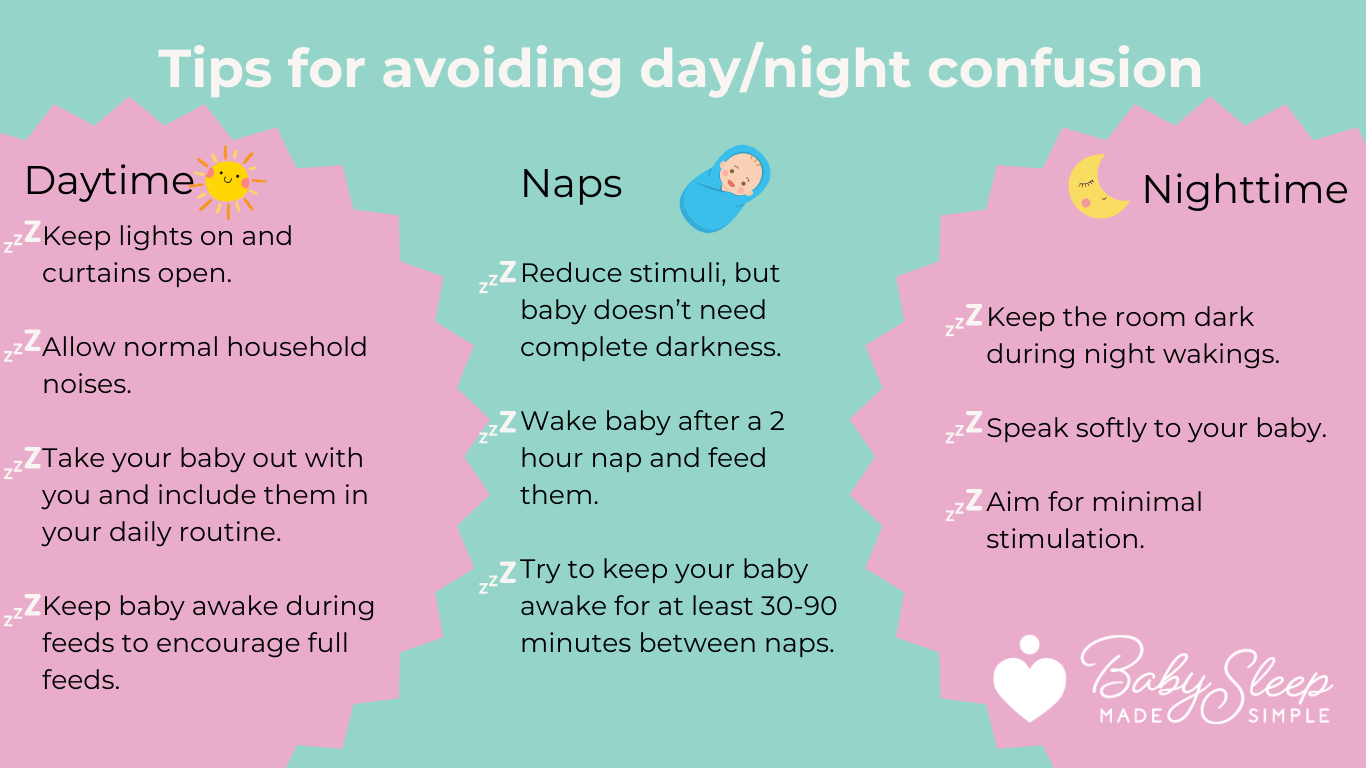The first few weeks with a newborn are a total whirlwind of joy, exhaustion, cracked nipples and poop-stained clothes. Amidst all the newness that comes with your beautiful newborn there is one especially tiring phenomenon: day/night confusion.
Why does your newborn sleep like a log during the day and have no issue staying away for 2 hours at 3 am?!
My friend, you have entered the world of day/night confusion. It’s temporary, yet very tiring, and you can get through it using the advice from this guide. Let’s dive in, shall we?
Table of Contents
What is day/night confusion and why does it happen?
3 reasons for day/night confusion
Tips for avoiding day/night confusion
What is day/night confusion and why does it happen?
To be fair, day/night confusion isn’t really “confusion” at all. Your newborn’s circadian rhythm (or “body clock”) just hasn’t developed yet so they sleep and wake around the clock.
Your baby’s circadian rhythm starts developing during the first three months of life and during this time they will start sleeping more at night and less during the day.
Here are 3 reasons why day/night confusion exists in newborns:
First, when your baby was in the womb their sleep patterns were closely linked to their mother’s movements. During the day, when mom was active, her movements would lull baby to sleep. And at night, when mom wanted to rest, baby would often wake up and become active.
Think of it like this: in the womb your baby got used to being rocked to sleep during the day and spending their nights more alert.
Second, melatonin is an important hormone in regulating sleep patterns. It is produced by the pineal gland in the brain and it helps regulate the sleep/wake cycle and circadian rhythm. When your baby was in the womb, melatonin production was regulated by their mother. Now that they’re in the big, bad world it’s up to them to secrete their own melatonin. (Breastfeeding babies receive melatonin in breast milk.)
Your baby’s brain will begin producing melatonin around 2-3 months old (premature babies can have delayed melatonin production.) So until your baby’s melatonin production is established, they won’t yet have their days and nights down.
Third, newborns need to wake during the night for frequent feeds and this feeding pattern can exacerbate day/night confusion. For example, if your baby was up 4 times in the night for feedings, they may end up sleeping a lot during the day. And the cycle continues.
This is all normal newborn stuff and remember, it’s temporary. Keep reading…..
Tips for avoiding day/night confusion
Although much of the development of your baby’s body clock is pre-programmed and will work itself out, there are things that parents can do to help their baby learn the difference between day and night.
During the day
- Keep up normal household activity e.g. it’s ok to have the lights on and the curtains open.
- Allow normal household noises. No need to have silence while your baby naps.
- Take your baby out for errands, walks, and play dates. Getting out into natural sunlight works wonders with setting the body clock. Include your newborn in your daily routine
- Keep your baby awake during feeds to encourage them to take full feeds (as best you can).
For naps
- No need to dim the lights and close the curtains when your baby is napping. Most newborns can sleep in bright, noisy rooms just fine.
- Utilize naps on-the-go (stroller, baby carrier). Make sure you supervise all naps outside of the bassinet or crib.
- Wake your baby after a 2 hour nap. Time for a feed!
- Try to keep your baby awake for 30-90 minutes until their next nap. (This may not be possible for your newborn, but by 2 months old it’s a good idea to start working on it.)
During the night
- You want to send the signal that nighttime = sleep time. So, during night wakings keep the bedroom dark with minimal activity. I walk you through the details of how to set up your baby’s bedroom for optimal sleep in my Exhausted Mom’s Starter Kit.
- When your baby wakes, first change the diaper. Then put their sleep sack back on. Finally, keep the bedroom darkened as you feed and burp your newborn so they can easily fall back to sleep.
- If your baby is fussy or needs to be comforted, speak or sing softly to them. Rock, hold or feed them in a quiet, dark room.

Final Thoughts
Like all baby phases, the phase of day/night confusion will pass! It just takes time, patience and caffeine for parents every morning. By 2-3 months old your baby’s day/night confusion should be gone and their melatonin production established, both of which help them settle into a nice sleep routine.
Until then you can help to encourage their body clock to settle into a good rhythm by following the tips in this article; making sure to limit naps during the day and get out of the house too, and do your best to keep a calm and quiet environment overnight.
Hang in there – you’re not alone and it will get better!
















0 Comments